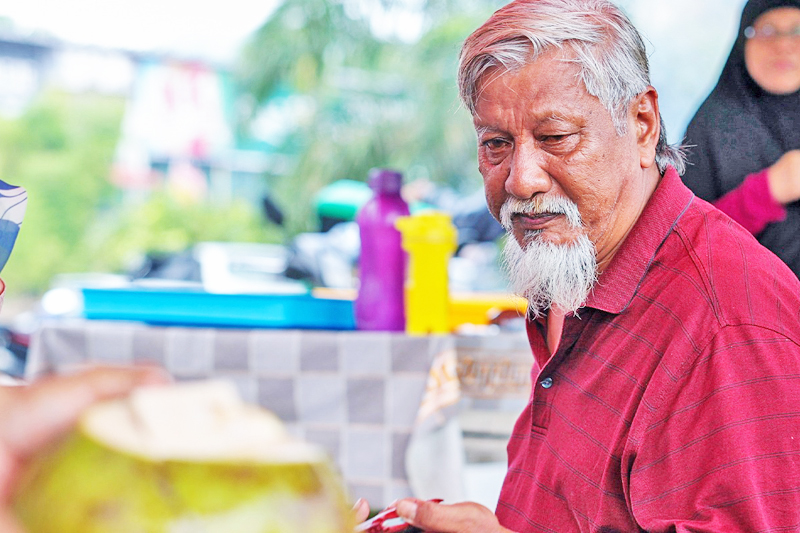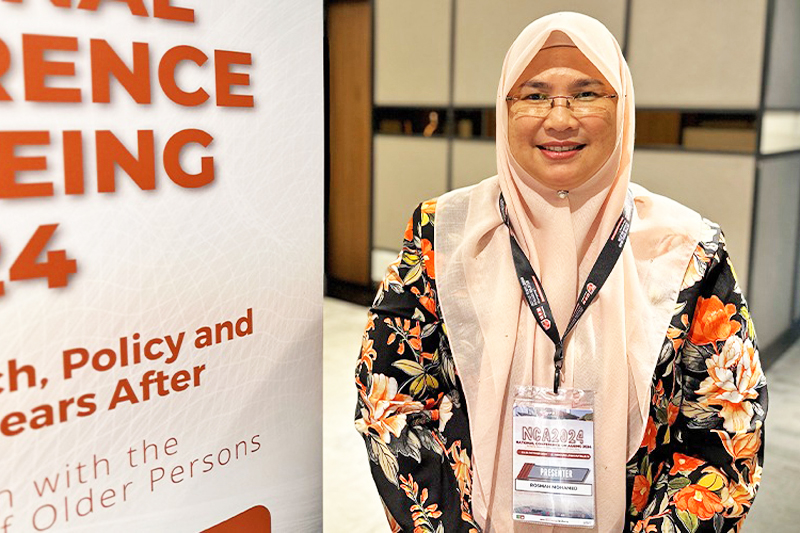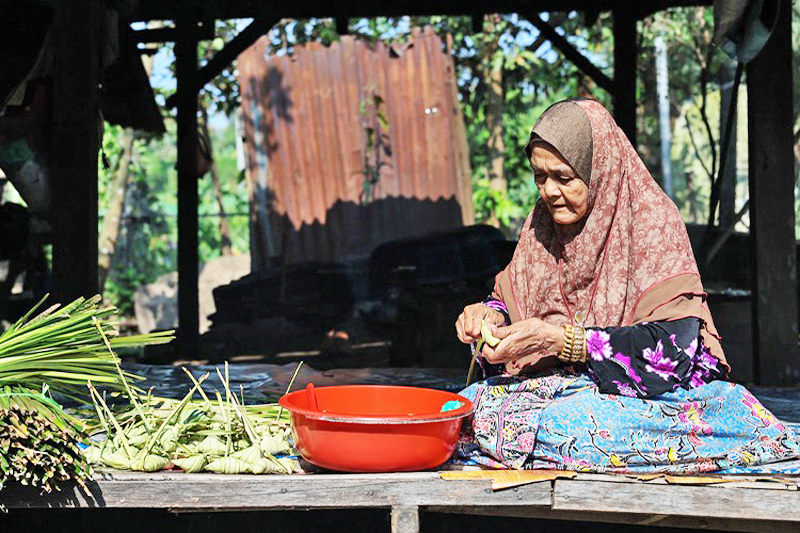By Nina Muslim –
KUALA LUMPUR – Babs (not her real name) works as an e-hailing driver despite being in her 60s.
This woman lives at home with her husband, while the children have grown up and no longer live with them.
For now his health is good and he is an e-hailing driver to fill his empty savings bank.
When asked about the savings of the Employees’ Provident Fund (EPF), he chuckled before replying, “It’s long gone.”
Cheerful and independent, Babs is aware that her time is running out and she fears that one day she will have to rely on others even for simple things. Worry engulfed him when he thought that one day he would no longer be able to afford basic necessities.



“Need to start saving from now. Make sure you have money (for use after retirement),” he told Bernama.
Babs was not alone in facing poverty in her old age. Poverty in old age is a big threat, not only for Malaysians who are retired or about to retire, but also for their families. This situation does not promise a bright future for the country when the elderly population is increasing and the size of human resources is shrinking.
As of last August, Malaysia had 3.9 million citizens aged 60 and above, according to the Malaysian Statistics Department. This amount includes 11.8 percent of the population. Senior citizens aged 65 and over amount to 2.6 million people or 7.7 percent of the total population, thus placing Malaysia as an aging country. The World Bank projects that this country will have the status of an aging country with 14 percent of the population aged 65 and over by 2040.
At the recent National Conference on Aging (NCA) 2024 in Putrajaya, participants discussed issues and presented studies related to ageing, including whether financial preparations and social support are sufficient to meet the needs of the elderly population.
The answer is no.
“The middle class will live their old age in poverty,” said Rashidi Yahya, Chairman of KENDANA Malaysia, which is an organization that represents caregivers and caregivers, to Bernama.
In other words, a long life does not mean a better life.
NO CHANGE
It is not right if the solution to the issue of elderly poverty is left to the government alone. Although there are policies that the government can implement to help, experts say the responsibility rests on the shoulders of the people themselves to prepare for old age.
But that is very difficult to do.
The Retirement Strategic Agenda Survey released on October 22, found that respondents did not take retirement funds seriously. The study conducted by Kumpulan Wang Persaraan (KWAP) and Universiti Putra Malaysia (UPM) think tank MyAgeing involved 6,252 prospective retirees and 1,075 government sector pension recipients.
Project leader Dr Rosmah Mohamed, an economist at UPM, told Bernama that one of the findings that caught his attention was that attitudes towards retirement have not changed, which is the same as the results of studies on retirement preparations conducted before. Only 19 percent said they save regularly, another 54 percent save occasionally, while the rest do not save at all.
“The last study was conducted in 2017, so in seven years the attitude is still the same,” he said, adding that respondents listed basic expenses, debt repayment and children’s education as the three main reasons they were unable to save regularly.
This lack of awareness about retirement is also reflected in other studies regarding the attitude of Malaysian workers, not just civil servants. A survey by the Asian Development Bank-Universiti Malaya published in 2023, found almost two-thirds of Malaysians do not prioritize saving for retirement, with 26 percent saying they may have to work until they die.
Pensions are generally for civil servants, but for those working in the private sector or non-pension scheme employees, they will prepare for retirement through the EPF. This institution pays a guaranteed dividend of at least 2.5 percent per year for each contributor’s savings.
However, the spread of the pandemic resulted in more than 90 percent of EPF contributors under the age of 30 not having enough savings to reach the target of RM240,000 by the age of 55, according to the Khazanah Research Institute report “Household Situation 2024: Household and Pandemic 2019-2022” .
The study also found that over 52 percent of EPF contributors under the age of 55 have savings of less than RM10,000 and over 25 percent under the age of 55 have savings of less than RM1,000.
Even so, the reality is that the pandemic only adds to the severity of the existing situation.
A survey by Bank Negara Malaysia in 2017 found that only 40 percent of Malaysians are financially prepared for retirement, and more than 75 percent admit it is difficult for them to save RM1,000 as an emergency.
SURE IS NOT PLACE
Despite the low amount of savings and the risk in the future, Rosmah said most of the respondents in the KWAP study were not upset. The findings echo the results of an HSBC survey conducted in 2013 on Malaysians’ attitudes towards retirement.
“(Civil servants) are not so worried about savings because they are confident of receiving a pension,” he said.
EPF contributors also have a similar attitude, according to a study conducted by Park and Estrada in 2012, which found that the availability of forced saving mechanisms in civil servant schemes and the EPF is a factor in Malaysians not feeling the need to save for retirement.
This kind of attitude worries experts because many seem to be unaware of how high the cost of living as an elderly person is. Most future retirees also expect their grown-up children to help and take care of them in their old age, without thinking that their children will also need to save for their own retirement.
Rosmah said that although Malaysians are expected to take care of their parents in terms of culture, such expectations are not wise.
“We all say ‘children have to be helped,’ actually not. There can be no such thoughts. Make the assumption that the children are not there, we cannot help, so we have to prepare ourselves,” he said.
Director of MyAgeing Prof. Associate Dr Rahimah Ibrahim agreed, and said the situation might also drag the children’s families into poverty. After all, children are not always able to help meet the medical and financial needs of the elderly.
“Most of us are usually in a state of unpreparedness when a family member falls ill, and suddenly they become the caretaker. This situation will stress them because there is no emergency savings for long-term care,” he said.
“This situation will be a huge burden on the family,” he added and explained, among them the elderly are at high risk of injury.
One fall already costs thousands of ringgit in addition to affecting their movement.
For those suffering from dementia, the risk of falling is higher, which means that it requires greater costs in addition to the burden of their care.
Moreover, not many children have the medical training to meet the needs of their parents, thus risking worsening the situation.
Many workers, the majority of whom are women, are forced to quit their jobs to care for sick parents and this reduces household income.
In addition, in order to ensure that their homes are safe for the elderly, they have to make renovations and this also costs money. Although the government provides financial assistance for that purpose, assistance is only based on need.
“If he thinks he needs help, our staff will go and see if it is true or not that he is eligible to receive an allowance. So far, if I’m not mistaken, the total allowance we gave them amounted to RM1.3 billion. Not just for the elderly, but the whole,” said Women, Family and Community Development Minister Datuk Seri Nancy Shukri Named outside the 2024 NCA.
The Ministry of Housing and Local Government informed Named which they are also trying to increase the number of care centers by taking advantage of empty buildings if necessary. The problem is getting the consent of the community who may not like their house or premises to be “neighboring” the elderly care center.
In the 2025 Budget, the Prime Minister of Malaysia, Datuk Seri Anwar Ibrahim announced the extension of tax relief to children who care for their parents or grandparents, including the purchase of equipment and medicines.
The government has also expanded EPF coverage to the self-employed, housewives and informal workers. However, contributions are voluntary and savings withdrawals are generally allowed, making EPF more of a savings account, not a long-term investment.
According to MyAgeing senior researcher Chai Sen, the way the government distributes aid may also be wrong because the calculation is only made based on household income without taking into account the size and needs of the household.
“When you apply for help, the government says the household income must be less than RM1,000. However, let’s say my household has four people, while another household has 10 people. Do we still use the calculation at the RM1,000 level?” the question.
In the end, he said the situation resulted in elderly people who are retired but living alone receiving greater financial assistance than elderly people who live with family and have larger household sizes. – Named

